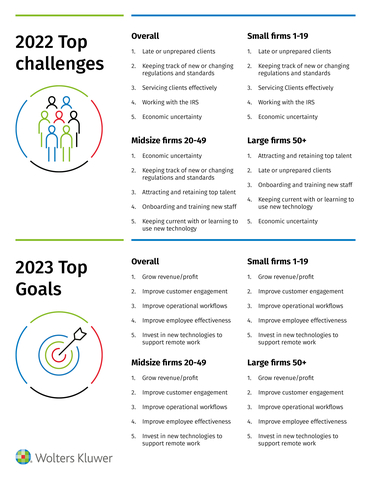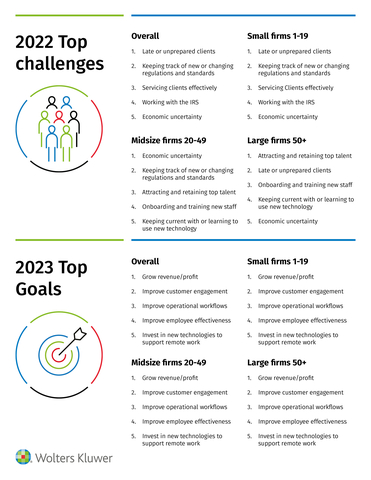NEW YORK--(BUSINESS WIRE)--Wolters Kluwer Tax & Accounting today shared the results of its 16th annual survey of tax and accounting professionals, which found that even in the face of challenges like economic uncertainty and changing tax legislation, early adoption of integrated, cloud-based technology is driving gains in efficiency, productivity, revenue and profitability among accounting firms of all sizes.
Detailed findings from the Wolters Kluwer Annual Accounting Industry Survey are available in this white paper – and an executive summary highlights top takeaways. Almost half of the nearly 2,000 firms surveyed said the 2021 tax season was better than the year prior, and nearly 80% said that advances in technology led to a reduction in the number of hours spent per tax return. Firms using a cloud-based tax compliance solution reported higher revenue growth than traditional firms (7% to 4%, respectively). Innovative and early-adopter firms were also 13% more likely to add services.
Jason Marx, President and CEO of Wolters Kluwer Tax and Accounting North America, said:
“In a world that’s embracing digital transformation, firms that prioritize the adoption of integrated, cloud-based technology will continue to drive a competitive advantage. Future-focused firms must implement and fully leverage strategic technology plans that optimize their processes, unlock their data, free up staff time and empower their people to go beyond traditional compliance to deliver the value-added advisory services clients want.”
In 2022, the top challenges firms faced varied by size
In 2020, firms of all sizes were mired in navigating the daily challenges of a global pandemic. In 2021, firms grappled with rapid legislative changes and finding ways to work effectively with the IRS. In 2022, the most pressing challenges firms face varied, based on firm size.
- In 2022, half of this year's survey respondents reported late or unprepared clients to be a top challenge.
- Only two challenges – economic uncertainty and keeping track of new or changing regulations and standards – were expressed as a top five challenge faced by firms of all sizes.
- Midsize firms were most concerned about economic uncertainty, large firms were most concerned about retaining/attracting talent.
- Midsize and large firms are trying to keep current with technology and learn to use their technology more effectively.
2023 goals: Firms are prioritizing revenue growth, efficiency and client engagement
Firms of all sizes ranked growing revenue/profit as their top goal for 2023, followed by improving customer engagement. Additionally, 85% reported that their clients want strategic tax planning and advisory services. Given that recruiting and retaining talent emerged as a top-five challenge among mid-sized and large firms, it’s not surprising that improving operational workflows and employee effectiveness ranked #3 and #4 on the overall list of firm goals for 2023, followed by investments in new technologies that support remote work.
Future-focused firms are using technology to deliver new services while driving staff efficiency and engagement
While the global COVID-19 pandemic significantly accelerated the pace of digital transformation within the tax and accounting industry, the majority of firms indicated that investments in integrated, cloud-based technology are paying off, and most said that the pace of technological change is “about right.”
- 78% of firms are leveraging technology to help employees expand skillsets, while 64% are using it to improve staff engagement and morale
- 77% said that technology is helping them reduce the number of hours worked, per client, and per return
- 73% said technology is helping improve average client response time and 72+% said technology is helping them recruit and retain clients
- 62% said technology is helping them add new services
Notably, the survey also revealed that less than 20% of firms feel they are using their tech stack to its fullest potential – despite two-thirds reporting that technology improves their ability to compete. This suggests that there is significant potential for firms to further improve returns on cloud-based technology investments going forward.
Survey Methodology
The 2022 Accounting Industry Survey from Wolters Kluwer Annual Tax and Accounting North America included quantitative interviews of 1,983 tax and accounting firms of all sizes from the United States, with 1,445 completed responses to examine how client expectations, technology and other factors are affecting the future of accounting across core areas and how accounting firms are prepared to address these issues and more. The Survey was conducted online.
About Wolters Kluwer
Wolters Kluwer (WKL) is a global leader in professional information, software solutions, and services for healthcare; tax and accounting; governance, risk, and compliance; and legal and regulatory sectors. We help our customers make critical decisions every day by providing expert solutions that combine deep domain knowledge with advanced technology and services.
Wolters Kluwer reported 2021 annual revenues of €4.8 billion. The group serves customers in over 180 countries, maintains operations in over 40 countries, and employs approximately 19,800 people worldwide. The company is headquartered in Alphen aan den Rijn, the Netherlands.
Wolters Kluwer shares are listed on Euronext Amsterdam (WKL) and are included in the AEX and Euronext 100 indices. Wolters Kluwer has a sponsored Level 1 American Depositary Receipt (ADR) program. The ADRs are traded on the over-the-counter market in the U.S. (WTKWY).
For more information, visit www.wolterskluwer.com, and follow us on Twitter, Facebook, LinkedIn, and YouTube.




